Coursera Sunsets World’s Most Popular Online Course
The machine learning course that led to Coursera’s creation is replaced by a toned-down specialization.
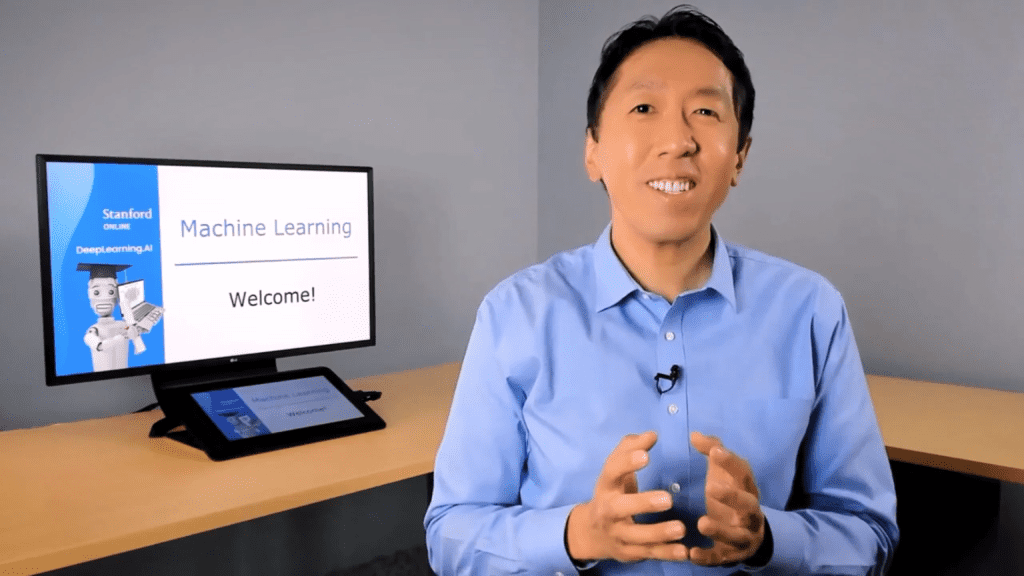
Last week, Coursera retired the online course Machine Learning, taught by Stanford Prof. Andrew Ng.
The course had accrued 4.8M learners since its launch in late 2011, making it the world’s most popular online course ever, and by the same token, one of Class Central’s Most Popular Courses of All Time.
It was one of the three “original MOOCs” that gave rise to the modern online education movement, its extraordinary popularity prompting Prof. Ng to cofound Coursera in early 2012.
The course, academic in nature, to try to mirror Stanford’s on-campus experience, has been replaced by a three-course specialization, with an updated curriculum but also with a more vocational tone.
Original Course: Origins
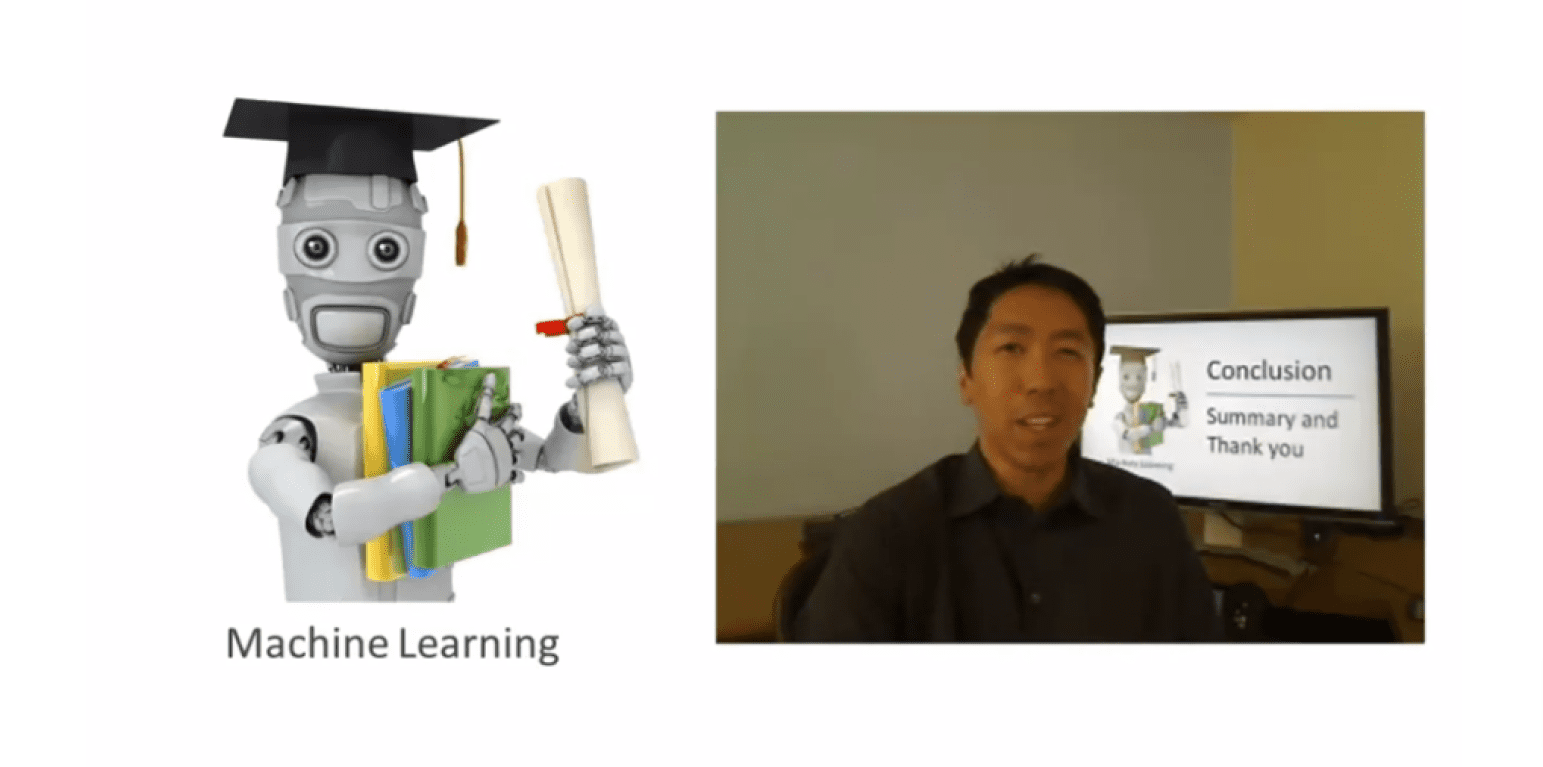
To understand the significance of Prof. Ng’s original machine learning course, we have to go back a decade. In late 2011, as covered by Class Central, three Stanford professors decided to conduct an experiment: putting their on-campus courses online, making them freely accessible to learners worldwide.
These courses, which would later be called “MOOCs” (for massive open online course), were an instant success. And Prof. Ng’s Machine Learning course was one of them. By the time it launched, the course had over 100K enrollments, an unprecedented success at the time.
This immediate success denoted a strong appetite worldwide for this sort of course, emboldening Prof. Ng to take things further. In January 2012, just four months after the launch of his machine learning course, Prof. Ng cofounded Coursera with Prof. Daphne Koller.
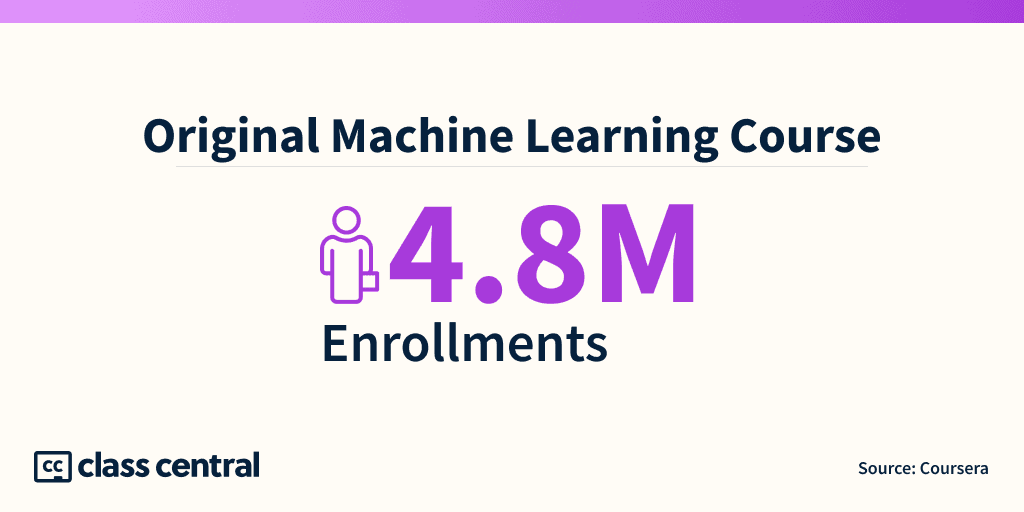
In the decade that followed, Coursera turned into a $2B company, and its catalog grew to over 8000 courses. But Prof. Ng’s Machine Learning course remained the platform’s most popular course, eventually reaching 4.8M enrollments.
Along the way, Prof. Ng founded another company, DeepLearning.AI, which offers online courses on artificial intelligence, also prominently featured on Coursera.
Now, eleven years after its launch, Prof. Ng and Coursera have sunsetted the original Machine Learning course — the very course that served as impetus for the creation of the Coursera platform.
If you were already enrolled in the course, you can still access it and submit assignments until mid-December 2022. But the original course isn’t accepting new enrollments anymore.
(To learn more about the origins of the modern online education movement, read Class Central’s article: Capturing the Hype: Year of the MOOC Timeline Explained)
Original Course: Curriculum
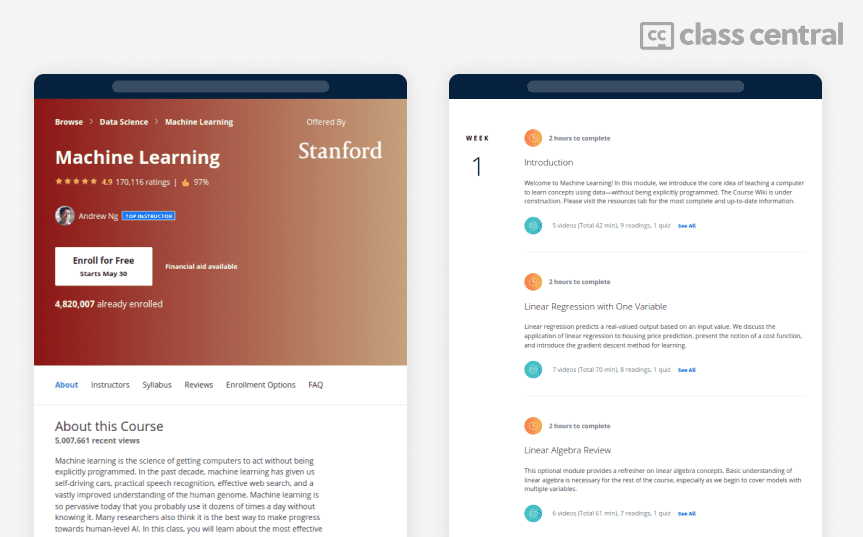
Prof. Ng’s original machine learning course was very academic, trying to mirror its on-campus counterpart. The course didn’t shy away from the math that underpins machine learning models, ensuring that learners would not only be able to use the models but would also understand their intricacies.
But machine learning has continued to evolve and expand. The basics haven’t fundamentally changed: we’re still trying to minimize loss; gradient descent isn’t going away any time soon; and simple regressions remain surprisingly effective. But the course had been showing its age for quite some time, in particular due to some of Prof. Ng’s initial technical choices.
Most notably, the course used the programming language Octave. Nowadays, Python has become the de facto language of artificial intelligence, and thereby, of machine learning. But that wasn’t the case back when Prof. Ng launched his course, hence why he favored a now considered niche programming language.
Over the years, some aspects of the course were updated, and there were ways to complete the assignments in Python. But the course’s video lectures continued to reference the Octave language, making for a disconnected learning experience.
In addition, the course didn’t cover, or barely touched on, some of the machine learning methods that only came to prominence more recently, such as generative adversarial networks. So the course was definitely due for a refresh.
New Specialization & Curriculum
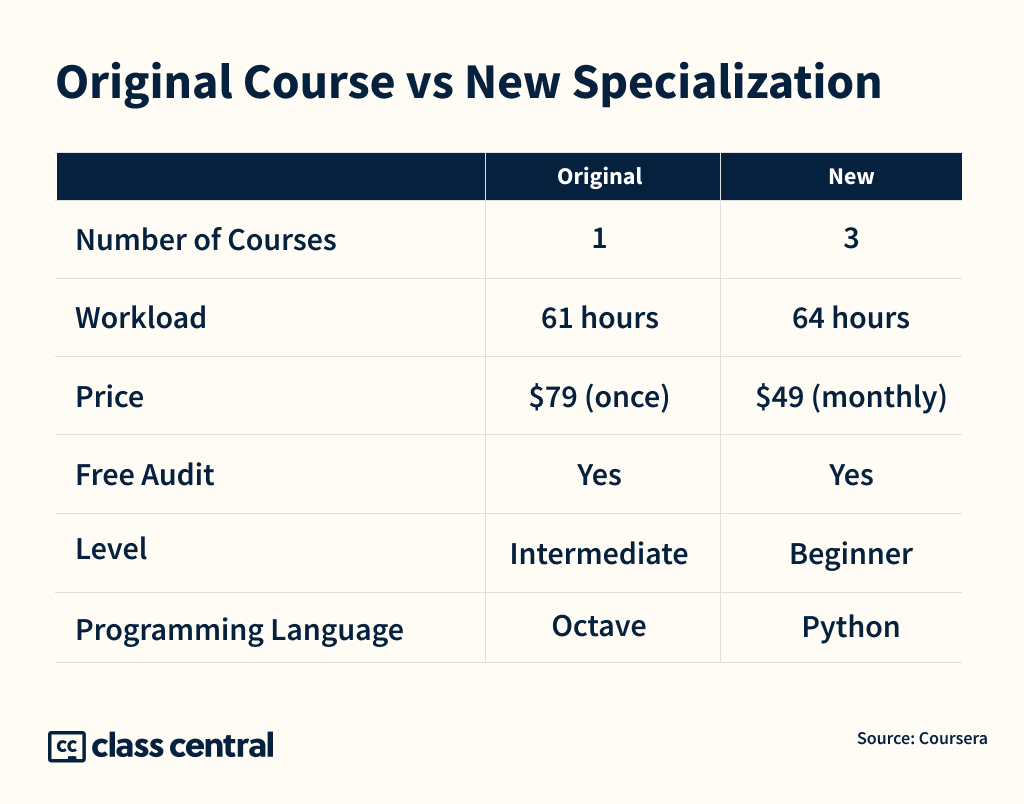
What might have come as a surprise to some, however, is that rather than simply refreshing the curriculum (for instance, by filming new videos, like Harvard does with CS50), Prof. Ng and Coursera decided to entirely retire the course, replacing it with a new offering that departs from the original course in two significant ways:
First, it’s not a single course anymore. Instead, it’s a “Machine Learning Specialization”, which includes three courses:
- Supervised Machine Learning: Regression and Classification
- Advanced Learning Algorithms
- Unsupervised Learning, Recommenders, Reinforcement Learning
Interestingly, there are several specializations with the exact same name on Coursera. For instance, the University of Washington also offers a “Machine Learning Specialization,” as you can see in the image below.
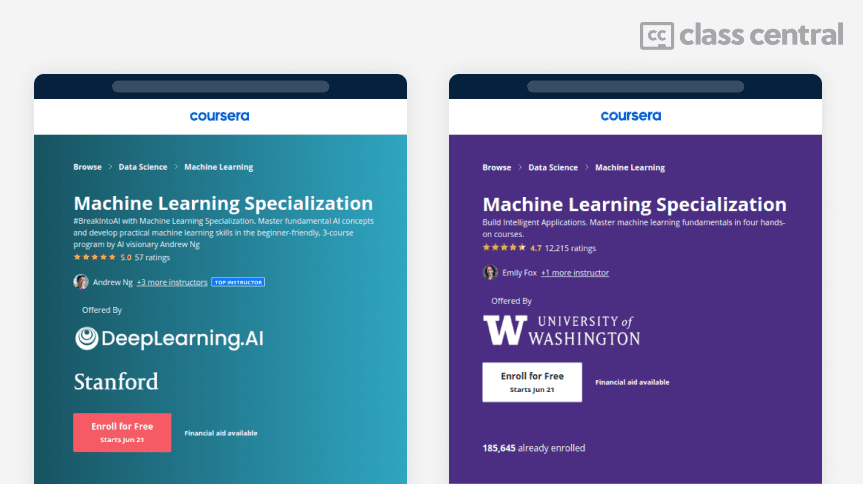
So Prof. Ng went from teaching the Machine Learning course to teaching one of several Machine Learning specializations on Coursera. From a brand recognition perspective, the waters seem muddier.
That said, it’s safe to assume the new specialization will find its audience. The links that once led to the original course, now direct to the new specialization. And given Prof. Ng’s involvement, the program will likely be given a place of choice on Coursera.
Second, it’s not as academic as it used to be. Instead, it favors a more vocational approach. Prof. Ng puts it as follows:
“This program does not assume much math background or deep coding experience. Unlike the original course which had assumed much more math background, I’ve redesigned the specialization to make sure that you can gain a deep understanding of machine learning and really understand how it works, but without getting into as much tricky math.”
Over the years, machine learning, once confined to academia and bleeding edge tech, has been commoditized. There’s now a flurry of upskilling offerings and off-the-shelf software solutions making machine learning more accessible than ever before for the career-conscious learner.
Moreover, these offerings often target businesses, promising to help them inject AI into their operations. This goal is enshrined in the mission statement of Prof. Ng’s DeepLearning.AI: “empowering the global workforce to build an AI-powered future.”
This likely explains the vocational tone of the new specialization, more concerned with making the course accessible to people from all walks of life than to embody the university experience.
Tags







TC
Is there any way to still take the original Andrew Ng Machine Learning course, or at least download it? I can’t be the only one who would like to see the classic material. Even if the material is dated, I would far prefer an academic course that requires programming experience and more than high-school math. If the two versions of the course are so different, they should have made both versions available, rather than deleting the most popular course ever. I feel that I missed out.
RM
Agree. Felt the same. They should have kept both versions.
Tushar
Have you found the course?
Ethan
Please we need both versions